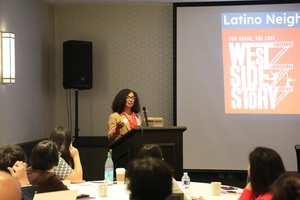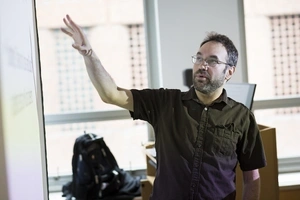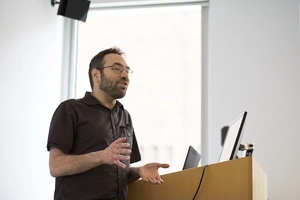Biography
Dr. Baker researches how students use and learn from educational games, intelligent tutors, and other kinds of educational software. Drawing on the fields of learning analytics and learning engineering, he develops methods for mining the data that come out of the interactions between students and educational software. He then uses this information to improve our understanding of how students respond to educational software, and how these responses influence their learning.
Prior to joining Penn GSE, Dr. Baker was an associate professor in the Department of Human Development at Teachers College, Columbia University. He has been teaching the “Big Data and Education” MOOC for over a decade, with total enrollment of more than 100,000 students. He has served as founding president of the International Educational Data Mining Society, where he currently serves on the board of directors. He has been co-author on over a dozen award-winning papers and received the Educational Research Award from the Council of Scientific Society Presidents.
- Ph.D. (Human–Computer Interaction) Carnegie Mellon University, 2005
- M.S. (Human–Computer Interaction) Carnegie Mellon University, 2005
- Sc.B. (Computer Science) Brown University, 2000
- Educational data mining
- Learning analytics
- Learning engineering
- Student modeling
- Disengagement
- Affective computing
- Massive online open courses
- Quantitative ethnography
Research Interests and Current Projects
Dr. Baker is currently serving as Director of the Penn Center for Learning Analytics.
In recent years, Dr. Baker and his colleagues have developed automated detectors that make inferences in real-time about students' affect and motivational and meta-cognitive behaviors, using data from students' actions within educational software (without using any sensor, video, or audio data). Areas of focus include gaming the system, off-task behavior, carelessness, boredom, frustration, engaged concentration, and appropriate use of help and feedback. They use these models to make basic discoveries about human learning and learners. Many of these models are developed using data collected through the Baker Rodrigo Ocumpaugh Monitoring Protocol (BROMP) — an electronic coding procedure developed by Baker and Ma. Mercedes R. Roderio—as well as the HART Android app.
Dr. Baker and his colleagues have also studied engagement in MOOC courses, developing models to predict which learners submit scientific papers related to the MOOC afterwards. Dr. Baker and his colleagues are developing enhanced MOOCs that incorporate features from intelligent tutoring systems.
Other current projects include work to predict K–12 and undergraduate success, the development of detector-driven classroom interviewing methods that inform interviewers in real-time about changes in student affect and self-regulated learning behavior, analysis of which features in the design of online mathematics homework lead to differences in engagement, and analysis of student behavior in educational software across cultures.
Journal Articles
Godwin, K. E., Almeda, M. V., Seltman, H., Kai, S., Skerbetz, M. D., Baker, R. S., Fisher, A.V. (in press). Off-task behavior in elementary school children. Learning and Instruction.
Bosch, N., D’Mello, S. K., Ocumpaugh, J., Baker, R. S., & Shute, V. (in press). Using video to automatically detect learner affect in computer-enabled classrooms. ACM Transactions on Interactive Intelligent Systems.
Baker, R. S. (2016). Stupid tutoring systems, intelligent humans. International Journal of Artificial Intelligence and Education, 26(2), 600–614.
Baker, R., Clarke-Midura, J., & Ocumpaugh, J. (2016). Toward general models of effective science inquiry in virtual performance assessments. Journal of Computer Assisted Learning, 32(3), 267–280.
Kovanovic, V., Gasevic, D., Dawson, S., Joksimovic, S., Baker, R. S., & Hatala, M. (2015). Does time-on-task estimation matter? Implications on validity of learning analytics findings. Journal of Learning Analytics, 2(3), 81–110.
Mulqueeny, K., Kostyuk, V., Baker, R. S., & Ocumpaugh, J. (2015). Incorporating effective e-learning principles to improve student engagement in middle-school mathematics. International Journal of STEM Education, 2(15).
Shute, V. J., D'Mello, S., Baker, R., Cho, K., Bosch, N., Ocumpaugh, J., Ventura, M., & Almeda, V. (2015). Modeling how incoming knowledge, persistence, affective states, and in-game progress influence student learning from an educational game. Computers & Education, 86, 224–235.
Comer, D., Baker, R., & Wang, Y. (2015). Negativity in massive online open courses: Impacts on learning and teaching. InSight: A Journal of Scholarly Teaching, 10.
Ogan, A., Walker, E., Baker, R., Rodrigo, M. M. T., Soriano, J. C., & Castro, M. J. (2015). Towards understanding how to assess help-seeking behavior across cultures. International Journal of Artificial Intelligence in Education, 25 (2), 229–248.
Gobert, J. D., Baker, R. S., & Wixon, M. B. (2015). Operationalizing and detecting disengagement within online science microworlds. Educational Psychologist, 50(1), 43–57.
Wang, Y., & Baker, R. (2015). Content or platform: Why do students complete MOOCs? MERLOT Journal of Online Learning and Teaching, 11(1), 17–30.
Wang, Y. E., Paquette, L., & Baker, R. (2014). A longitudinal study on learner career advancement in MOOCs. Journal of Learning Analytics, 1(3), 203–206.
Roll, I., Baker, R. S. Jd., Aleven, V., & Koedinger, K. R. (2014). On the benefits of seeking (and avoiding) help in online problem-solving environments. Journal of the Learning Sciences, 23(4), 537–560.
Baker, R. S., Corbett, A.T. (2014). Assessment of robust learning with educational data mining. Research & Practice in Assessment, 9, 38–50.
Baker, R. S. (2014). Educational data mining: An advance for intelligent systems in education. IEEE Intelligent Systems, 29 (3), 78–82.
Berland, M., Baker, R. S., & Blikstein, P. (2014). Educational data mining and learning analytics: Applications to constructionist research. Technology, Knowledge, and Learning, 19, 205–220.
Miller, W. L., Baker, R. S., & Rossi, L. M. (2014). Unifying computer-based assessment across conceptual instruction, problem-solving, and digital games. Technology, Knowledge, and Learning, 19, 165–181.
Pardos, Z. A., Baker, R. S., San Pedro, M. O. C. Z., Gowda, S. M., & Gowda, S.M. (2014). Affective states and state tests: Investigating how affect and engagement during the school year predict end of year learning outcomes. Journal of Learning Analytics, 1 (1), 107–128.
Ocumpaugh, J., Baker, R., Gowda, S., Heffernan, N., & Heffernan, C. (2014). Population validity for educational data mining models: A case study in affect detection. British Journal of Educational Technology, 45(3), 487–501.
San Pedro, M. O. Z., Baker, R. S. J. d., & Rodrigo, M. M. T. (2014). Carelessness and affect in an intelligent tutoring system for mathematics. International Journal of Artificial Intelligence in Education, 24, 189–210.
Baker, R. S. J. d., Corbett, A. T., & Gowda, S. M. (2013). Generalizing automated detection of the robustness of student learning in an intelligent tutor for genetics. Journal of Educational Psychology, 105(4), 946–956.
Rodrigo, M. M. T., Baker, R. S. J. d., & Rossi, L. (2013). Student off-task behavior in computer-based learning in the Philippines: Comparison to prior research in the USA. Teachers College Record, 115(10), 1–27.
Porayska-Pomsta, K., Mavrikis, M., D’Mello, S., Conati, C., & Baker, R. S. J. d. (2013). Knowledge elicitation methods for affect modeling in education. International Journal of Artificial Intelligence in Education, 22(3), 107–140.
Baker, R. S. J. d., Hershkovitz, A., Rossi, L. M., Goldstein, A. B., & Gowda, S. M. (2013). Predicting robust learning with the visual form of the moment-by-moment learning curve. Journal of the Learning Sciences, 22(4), 639–666.
Gobert, J. D., Sao Pedro, M., Raziuddin, J., & Baker, R. (2013). From log files to assessment metrics: Measuring students’ science inquiry skills using educational data mining. Journal of the Learning Sciences, 22(4), 521–563.
Gowda, S. M., Baker, R. S. J. d., Corbett, A. T., & Rossi, L. M. (2013). Towards automatically detecting whether student learning is shallow. International Journal of Artificial Intelligence in Education, 23(1), 50–70.
Hershkovitz, A., Baker, R. S. J. d., Gobert, J., Wixon, M., & Sao Pedro, M. (2013). Discovery with models: A case study on carelessness in computer-based science inquiry. American Behavioral Scientist, 57(10), 1479–1498.
Winne, P. H., & Baker, R. S. J. d. (2013). The potentials of educational data mining for researching metacognition, motivation, and self-regulated learning. Journal of Educational Data Mining, 5(1), 1–8.
Sao Pedro, M. A., Baker, R. S. J. d., Gobert, J., Montalvo, O., & Nakama, A. (2013). Leveraging machine-learned detectors of systematic inquiry behavior to estimate and predict transfer of inquiry skill. User Modeling and User-Adapted Interaction, 23(1), 1–39.
Koedinger, K. R., Brunskill, E., Baker, R. S. J. d., McLaughlin, E. A., & Stamper, J. (2013). New potentials for data-driven intelligent tutoring system development and optimization. AI Magazine, 34 (3), 27–41.
Gobert, J. D., Sao Pedro, M. A., Baker, R. S. J. d., Toto, E., & Montalvo, O. (2012). Leveraging educational data mining for real-time performance assessment of scientific inquiry skills within Microworlds. Journal of Educational Data Mining, 4(1), 111–143.
Rodrigo, M. M. T., Baker, R. S. J. d., Agapito, J., Nabos, J., Repalam, M. C., Reyes, S. S., & San Pedro, M. C. Z. (2012). The effects of an interactive software agent on student affective dynamics while using an intelligent tutoring system. IEEE Transactions on Affective Computing, 3(2), 224–236.
Desmarais, M. C., & Baker, R. S. J. d. (2012). A review of recent advances in learner and skill modeling in intelligent learning environments. User Modeling and User-Adapted Interaction, 22 (1–2), 9–38.
Baker, R. S. J. d., Goldstein, A. B., & Heffernan, N. T. (2011). Detecting learning moment-by-moment. International Journal of Artificial Intelligence in Education, 21 (1–2), 5–25.
Pardos, Z. A., Baker, R. S. J. d., Gowda, S. M., & Heffernan, N. T. (2011). The sum is greater than the parts: Ensembling models of student knowledge in educational software. SIGKDD Explorations, 13(2), 37–44.
Rodrigo, M. M. T., & Baker, R. S. J. d. (2011). Comparing learners’ affect while using an intelligent tutor and an educational game. Research and Practice in Technology Enhanced Learning, 6(1), 43–66.
Baker, R. S. J. d., Isotani, S., & de Carvalho, A. (2011). Mineração de dados educacionais: Oportunidades para o Brasil. Revista Brasileira de Informática na Educação, 19(2), 3–13.
Baker, D. J., Baker, R. S. J. d., & Uhing, B. (2011). Content of instruction for transition-age youth with disabilities: A brief report. National Association for the Dually Diagnosed (NADD) Bulletin, 14(5), 89–94.
Baker, R. S. J. d. (2011). Gaming the system: A retrospective look. Philippine Computing Journal, 6(2), 9–13.
Baker, R. S. J. d., D'Mello, S. K., Rodrigo, M. M. T., & Graesser, A. C. (2010). Better to be frustrated than bored: The incidence, persistence, and impact of learners' cognitive-affective states during interactions with three different computer-based learning environments. International Journal of Human-Computer Studies, 68(4), 223–241.
Baker, R. S. J. d., & Yacef, K. (2009). The state of educational data mining in 2009: A review and future visions. Journal of Educational Data Mining, 1(1), 3–17.
Baker, R. S. J. d., Corbett, A. T., Roll, I., & Koedinger, K. R. (2008). Developing a generalizable detector of when students game the system. User Modeling and User-Adapted Interaction, 18(3), 287–314.
Baker, R. S. J. d., Walonoski, J. A., Heffernan, N. T., Roll, I., Corbett, A. T., & Koedinger, K. R. (2008). Why students engage in “gaming the system” behavior in interactive learning environments. Journal of Interactive Learning Research, 19(2), 185–224.
Baker, R. S. J. d., Corbett, A. T., & Koedinger, K. R. (2007). The difficulty factors approach to the design of intelligent tutoring systems. International Journal of Artificial Intelligence in Education, 17(4), 341–369.
Baker, R. S., Corbett, A. T., & Koedinger, K. R. (2006). Responding to problem behaviors in cognitive tutors: Towards educational systems which support all students. National Association for the Dually Diagnosed (NADD) Bulletin, 9(4), 70–75.
Tamassia, R., Goodrich, M. T., Vismara, L., Handy, M., Cohen, R., Hudson, B., Baker, R. S., Gelfand, N., Shubina, G., & Brandes, U. (2001). JDSL: The Data Structures Library in Java. Dr. Dobb's Journal and Sourcebook, April 2001, 21–33.
Book Chapters
Baker, R. S., & Inventado, P. S. (in press). Educational data mining and learning analytics: Potentials and possibilities for online distance education. In G. Veletsianos (Ed.), Emerging technologies in distance education. Edmonton, Alberta: Athabasca University Press.
Baker, R. S., Wang, Y., Paquette, L., Aleven, V., Popescu, O., Sewall, J., Rose, C., Tomar, G., Ferschke, O., Zhang, J., Cennamo, M., Ogden, S., Condit, T., Diaz, J., Crossley, S., McNamara, D., Comer, D., Lynch, C., Brown, R., Barnes, T., & Bergner, Y. (in press). A MOOC on educational data mining. In O. Zaiane, S. ElAtia, & D. Ipperciel, (Eds.), Data mining and learning analytics in educational research. Hoboken, NJ: Wiley-Blackwell.
Baker, R. (2016). Using learning analytics in personalized learning. In M. Murphy, S. Redding, & J. Twyman (Eds.), Handbook on personalized learning for states, districts, and schools (pp. 165–174).
San Pedro, M. O. Z., & Baker, R. S. (2016). Adaptive learning. In M. McCarthy (Ed.), The Cambridge guide to blended learning for language technologies (pp. 234–247). New York: Cambridge University Press.
Rowe, E., Asbell-Clarke, J., & Baker, R. S. (2015). Serious games analysis to measure implicit science learning. In C. S. Loh, Y. Sheng, & D. Ifenthaler (Eds.), Serious games analytics: Methodologies for performance measurement, assessment, and improvement (pp. 343–362). Berlin, Germany: Springer.
Baker, R. S. J. d., & Inventado, P. S. (2014). Educational data mining and learning analytics. In J. A. Larusson & B. White (Eds.), Learning analytics: From research to practice. Berlin, Germany: Springer.
Baker, R. S. J. d., & Ocumpaugh, J. (2014). Interaction-based affect detection in educational software. In R. A. Calvo, S. K. D’Mello, J. Gratch, & A. Kappas (Eds.), The Oxford handbook of affective computing. Oxford, UK: Oxford University Press.
Baker, R., & Siemens, G. (2014). Educational data mining and learning analytics. In K. Sawyer (Ed.), Cambridge handbook of the learning sciences (2nd ed., pp. 253–274). New York: Cambridge University Press.
DeFalco, J. A., Baker, R. S., & D'Mello, S. K. (2014). Addressing behavioral disengagement in online learning. In R. Sottilare, A. Graesser, X. Hu, & B. Goldberg (Eds.), Design recommendations for intelligent tutoring systems, volume 2: Instructional management (pp. 49–56). Orlando, FL: U.S. Army Research Laboratory.
D'Mello, S., Blanchard, N., Baker, R., Ocumpaugh, J., & Brawner, K. (2014). I feel your pain: A selective review of affect-sensitive instructional strategies. In R. Sottilare, A. Graesser, X. Hu, & B. Goldberg (Eds.), Design recommendations for intelligent tutoring systems, volume 2: Instructional management (pp. 35–48). Orlando, FL: U.S. Army Research Laboratory.
Baker, R. S. J. d. (2013). Learning, schooling, and data analytics. In M. Murphy, S. Redding, & J. Twyman (Eds.), Handbook on innovations in learning (pp.179–190). Philadelphia, PA: Center on Innovations in Learning.
Baker, R. S. J. d., & Rossi, L. M. (2013). Assessing the disengaged behavior of learners. In R. Sottilare, A. Graesser, X. Hu, & H. Holden (Eds.), Design recommendations for intelligent tutoring systems, volume 1: Learner modeling (pp. 155–166). Orlando, FL: U.S. Army Research Lab.
Baker, R. S. J. d., Corbett, A. T., Roll, I., Koedinger, K.R., Aleven, V., Cocea, M., Hershkovitz, A., de Carvalho, A. M. J. B., Mitrovic, A., & Mathews, M. (2013). Modeling and studying gaming the system with educational data mining. In R. Azevedo & V. Aleven (Eds.), International handbook of metacognition and learning technologies (pp. 97–116). New York, NY: Springer.
Rodrigo, M. M. T., & Baker, R. S. J. d. (2011). Comparing the incidence and persistence of learners’ affect during interactions with different educational software packages. In R. A. Calvo & S. D’Mello (Eds.), New perspectives on affect and learning technologies (pp. 183–202). New York, NY: Springer.
Koedinger, K. R., Baker, R. S. J. d., Cunningham, K., Skogsholm, A., Leber, B., & Stamper, J. (2010). A data repository for the EDM community: The PSLC DataShop. In C. Romero, S. Ventura, M. Pechenizkiy, & R.S.J.d. Baker (Eds.), Handbook of educational data mining (pp. 43–56). Boca Raton, FL: CRC Press.
Romero, C., Ventura, S., Pechenizkiy, M., & Baker, R. S. J. d. (2010). Introduction. In C. Romero, S. Ventura, M. Pechenizkiy, & R. S. J. d. Baker (Eds.), Handbook of educational data mining (pp. 1–8). Boca Raton, FL: CRC Press.
Baker, R. S. J. d. (2010). Mining data for student models. In R. Nkmabou, R. Mizoguchi, & J. Bourdeau (Eds.), Advances in intelligent tutoring systems (pp. 323–338). Secaucus, NJ: Springer.
Baker, R. S. J. d. (2010). Data mining for education. In B. McGaw, P. Peterson, E. Baker (Eds.), International encyclopedia of education, Volume 7 (3rd ed., pp. 112–118). Oxford, UK: Elsevier.
Koedinger, K., Aleven, V., Roll, I., & Baker, R. (2009). In vivo experiments on whether supporting metacognition in intelligent tutoring systems yields robust learning. In A. Graesser & D. Hacker (Eds.), Handbook of metacognition in education (pp. 383–412).
Related News
Penn GSE faculty and students contributed to discussions on quantitative ethnography at ICQE 2024, exploring innovative methods and applications in education.
- `
-
University Launches Master’s Degree for AI in Education
In the Media | Education Week
Ryan Baker is interviewed about the launch of our new master’s program in “Learning Analytics and Artificial Intelligence.”
-
University Launches Master’s Degree for AI in Education
In the Media | Education Week
Ryan Baker announced the University of Pennsylvania’s new master’s program in “Learning Analytics and Artificial Intelligence” to train professionals in applying AI within education and meeting industry demand.
-
Launching Fall 2025, this fully online program prepares professionals to integrate AI and learning science, driving innovation in education globally.
-
Artificial intelligence and data analytics are revolutionizing education — and Penn GSE’s Learning Analytics online M.S.Ed. program is perfectly timed to meet this growing demand.
-
The Penn GSE professor has co-authored 517 papers and been cited more than 30,000 times.
-
Ep.51 - Exploring Large Language AI Models with Ryan Baker
In the Media | Observatory of Educational Innovation
Ryan Baker explains the advancements and implications of large language AI models, and discusses Penn's JeepyTA virtual teaching assistant.
-
New generative AI tools like ChatGPT seemingly hit our classrooms overnight. In this episode, we're focusing on how educators are being forced to adapt and adopt on the fly.
-
Ryan Baker emphasizes the importance of ensuring secure data sharing between educational institutions and technology providers, particularly in the context of utilizing AI in education.
-
The Education System Isn’t Ready for Another Widespread Closure
In the Media | Undark Magazine
Ryan Baker says educators must look at a technology’s track record in the context of their own school’s demographics, geography, culture, and challenges when considering investing in new technology for the classroom.
-
Ryan Baker, who studies early warning systems, explains that the using demographic factors as predictors negatively impacts data.
-
Ryan Baker shares some best practices and which practices to avoid after two years of virtual learning. Virtual learning should focus on ensuring that students experience as little disruption to their education as possible. The key to that is creating a discourse around the use of technology.
-
Topics
Renowned edtech expert Ryan Baker talks about what we’ve learned — and how educators can put that knowledge to work.
-
A new report from Ryan Baker and the Penn Center for Learning Analytics examines the emerging field of learning engineering and recommends top opportunities where researchers and practitioners should focus their energies.
-
Researcher Ryan Baker on the changing face of ed tech amid the pandemic—and what should happen next
In the Media | The 74
TopicsRyan Baker spoke about his new report identifying areas of improvement for ed tech developers. “The number of educators who are fully satisfied with technology solutions is pretty low. They are looking for better ways to save time and effort for auto grading and looking for richer activities,” he said.
-
Temple’s business school sees virtual reality as future of online learning
In the Media | Philadelphia Inquirer
Ryan Baker is quoted on how the pandemic has necessitated innovation in remote learning, noting that, “There’s been a move to using high-quality interactive online learning environments.”
-
Ryan Baker led a team that analyzed the results of a survey about the challenges of remote learning. “School districts’ IT were never prepared for this to happen,” Baker said.
-
Ryan Baker said “A lot of these companies, it’s a matter of life or death if they get some evidence up on their page. No one is trying to be deceitful. (They’re) all kind of out of their depth and all trying to do it cheaply and quickly.”
-
Ryan Baker discussed adaptive learning, which can use algorithms to adapt lessons to individual students, as well as other computer-based learning tools.
-
We asked online education expert Ryan Baker what school leaders and parents should be thinking about it. His advice: be flexible — and don’t discount library books.
-
Reframing ed tech to save teachers time and reduce workloads
In the Media | The Hechinger Report
TopicsRyan Baker discusses AI technology and some of the shortcomings of existing technologies that are available to teachers.
Journal Editorial Boards
Computer-Based Learning in Context
Editor
International Journal of STEM Education
Editorial Board
Journal of Educational Data Mining
Associate Editor
User Modeling and User-Adapted Interaction
Editorial Board






